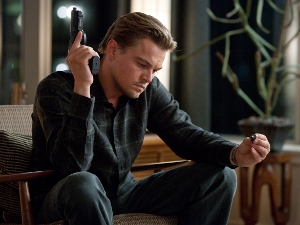[8]
Dreams are a notoriously difficult thing on which to base a movie. In dreams there are no rules, no parameters — and in movies about dreams, writers and filmmakers are often all too eager to take advantage of our suspension of disbelief — because in dreams, hey? Who the hell’s to say what could or could not happen, especially if the contrivance pushes the plot along? I frame my review of Inception with this acknowledgment because it makes Christopher Nolan’s film all the more impressive.
Inception, both written and directed by Nolan (Memento, The Dark Knight), is a well-grounded foray into the subconscious with enough rules, limits, and boundaries to make the fantasy of dreams a cogent reality. The screenplay is a marvel of intricate plotting — fast-paced, fiercely streamlined, and admirably shrewd in its delivery of exposition. For a film filled to the brim with ‘need-to-know,’ Inception is remarkable in giving only what you need, precisely when you need it. I also appreciate the fact that Nolan doesn’t equate intelligent, sophisticated filmmaking with gratuitous plot twists, the bane of modern cinema. I feared the sudden annoyance of a pesky twist throughout the film, but Nolan never springs one on you — he doesn’t need to. I think that speaks very highly of his confidence and ability as a storyteller. The entire cast is very good, from Leonardo DiCaprio on down. I particularly enjoyed Tom Hardy (the villain from Star Trek: Nemesis) and Marion Cotillard (Oscar nominee for Ma vie en rose).
This is the work of an auteur, and there aren’t many of them around any more.
With Joseph GordonLevitt, Ellen Page, Ken Watanabe, Cillian Murphy, and Michael Caine.
Academy Awards: Best Cinematography, Visual Effects, Sound Mixing, Sound Editing
Oscar Nominations: Best Picture, Original Screenplay, Original Score (Hans Zimmer), Art Direction

